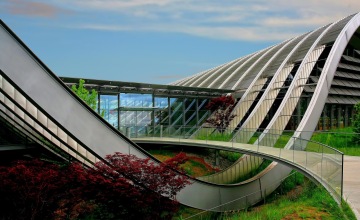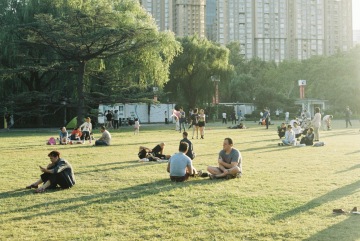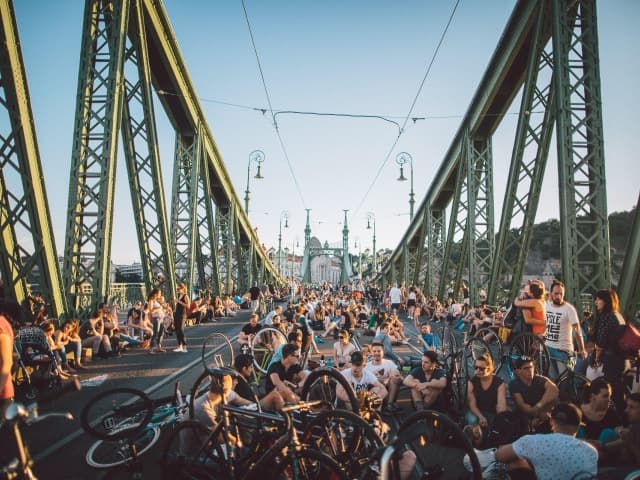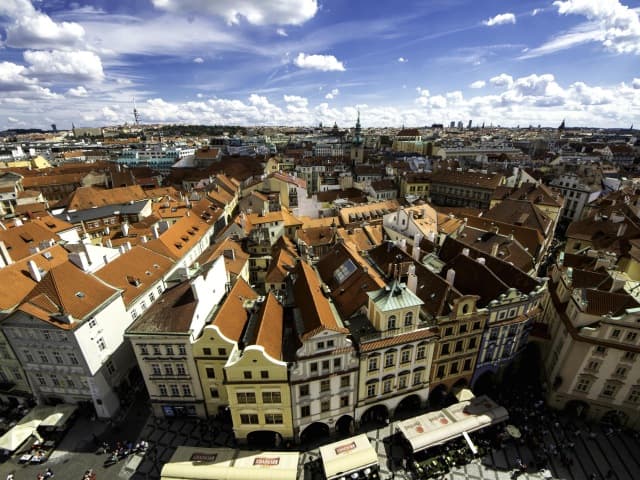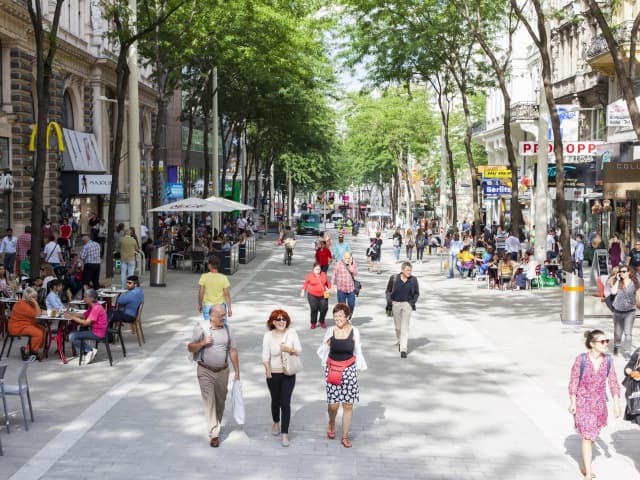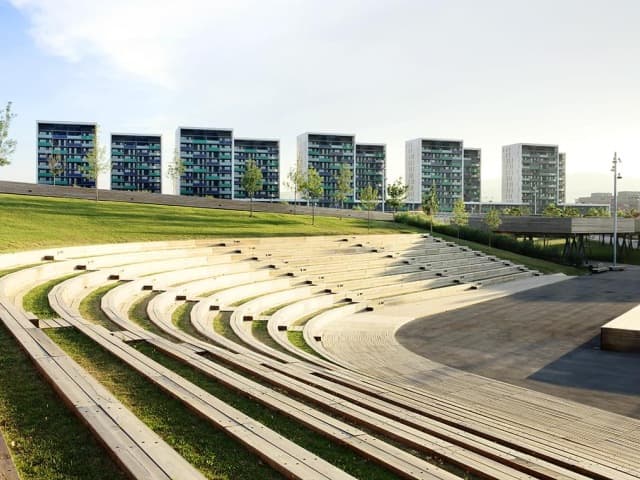
Don’t Pull the Brakes
How to turn Prague into a more livable city?
The city is a moving train. The job of mayors and other politicians is to get on the train without pulling the brakes. Never pull the brakes for political gamesmanship or personal gain. Prague’s politicians are experts at pulling the brakes. It is a disaster for the cultural, civic and economic life of the city and has wide-ranging, adverse effects.
In January 2015, I made the argument in a Hospodářské noviny op-ed that Minister Karla Šlechtová of the Ministry of Regional Development and Mayor of Prague Adriana Krnáčová were pulling the brakes. At the time, Šlechtová and Krnáčová used dubious legal and anecdotal claims to (again) postpone implementation of the newly drafted Prague Building Regulations under former Mayor Hudecek. The building regulations have since been modified modestly and approved with the author’s consent, but not without inflicting damage and uncertainty in the real estate market. The next battle, being waged quietly behind closed doors is to halt progress on the already delayed Metropolitan Plan; delayed because of politicians pulling the brakes.
Hana Boříková, in her recent E15 Opinion piece titled “No-Go Zone” correctly points out that failure to move forward with the Prague Building Regulations and sorely needed Metropolitan Plan ultimately hurts citizen consumers by driving up real estate prices due to decreasing supply and increasing demand in market-rate flats. However, Ms. Boříková doesn’t go far enough to address the breadth of this problem. The issue is not just that the market for flats has shrunk. The larger problem is far worse, far more complex and has yet to be studied by anyone in the public, private or civic sector.
Among 32 advanced high income countries in OECD, the Czech Republic ranks last in the length of time and process to get a construction permit. When compared with all OECD countries, regardless of GDP, the Czech Republic does a bit better: #127, worse than Djibouti, and between Tanzania and Papua New Guinea. To add to Ms. Boříková’s point about housing prices, the cost per square meter for flats has risen 6.9% over the last year, per the latest data.
These are not compelling numbers and stand in contrast to Mayor’s Krnacova’s published essay at the OECD Forum in June 2015. Krnacova contends that Prague is a “single-speed city,” successful because development progress aims for “inclusive growth that is both sustainable and flexible…without social, cultural or economic segregation.” Leaving aside this vision of a culturally integrated utopia in Prague, Mrs. Krnacova needs to do her best to keep herself or others in the fractured coalition from pulling the brakes on sustainable urban planning and development mechanisms such as the Metropolitan Plan, modernized building regulations and construction permits. The alternative is economic segregation and a depressed market.
While these problems increasingly jeopardize the economy at large, the largest challenges are qualitative. In a recent survey about Prague’s development strategy conduced by Deloitte Czech Republic, 98% of all expert respondents indicated that they had no confidence in development strategy for Prague. No one knows what the environment will be in any given week, particularly with a fractured coalition with no solution in sight. With this situation, international developers, real estate investors and the architecture community looks at Prague in disbelief, and waits.
If you doubt this, look at the skyline in Prague, including the surrounding districts. Do you see any cranes? Any public spaces under construction? A lack of construction projects translates to a depressed job market for construction workers. It means the global real estate investors put their money and innovation elsewhere. It means there is no funding for the things we at reSITE care about – new public space and alternative mobility. Most of the recent private investments in 2015 and 2016 have been risky ones, in historic buildings that will most likely need to be luxury flats sold to Russian and Chinese billionaires. Not exactly an integrated or sustainable development strategy. Talented Czech architects already struggled find good projects in a booming market. Offices need to look abroad for work. There is absolutely no market for foreign architects or urban designers in Prague, which is so limiting for the kinds of buildings and new products that developers can bring to the market. As mentioned, the broad economic, cultural and demographic impacts on the City need to be studied.
Our organization, reSITE, looks at development of the city as a natural process, a way for the city and its citizens to create a dynamic identity; to advance economically, culturally and environmentally. We care about public space and park development and know that it is impossible without development.
We wholeheartedly disagree with politicians pulling the brakes. At reSITE conference in June 2015, Deputy Mayor Matěj Stropnický made the argument that the city would be better off without private development at all. He is not alone. Environmental groups like Arnika share his view, without the understanding that without a comprehensive metropolitan plan that stresses density; the environment gets ruined because the city sprawls to the outskirts. This is a very basic underpinning of sustainable planning discourse. Stropnický might have good, albeit populist, intentions. It is just that he doesn’t know anything about urban development and sustainable planning. He has only highlighted a few very bad and corrupt cases while dismissing any opportunities that sustainable development can bring. Instead of working hard to find opportunities, he advocates for a do-nothing strategy. This is counterproductive in the year 2015.
Šlechtová, Krnáčová, and Matěj Stropnický have very different agendas; but their end goal is just as bad for Prague. They do all have something in common: a lack of vision and understanding about how an urban plan can carryout that vision. And, they like pulling the brakes.
If these officials spent their careers in architecture or urban planning, or at least if they understood the overall impacts of urban planning, or allowed international experts advise them on the matter – we might trust them to make the right decision. The troubling thing: none of them are urban planners, nor do they seek consul from those with international training or experience, nor do they understand the economic, social and environmental opportunities afforded by planning. Or, the ability to invest in public space with input from the private and philanthropic sectors. Ask each of them how long they have spent at an urbanism or planning conference. I am positive the number will be astonishingly low for a group who purportedly care about planning and development; care to stop it at least.
I come from NYC. It is where my young career as a landscape architect developed, designing parks and public spaces underneath one of the most progressive mayors in the world: Michael Bloomberg. Over the course of 12 years NYC rezoned 124 neighborhoods, or 40% of the city. That’s 12,500 blocks. 90% of new development in NYC is within a 10-minute walk of a subway or a park. New development on the riverfronts needs to include privately funded public parks and new bike lanes. Some 200,000 new affordable units are being built, per NYC Planning, as you read this.
NYC, not without urban development problems has turned into a much more livable place because of the private, public and civic sector working together to build the city. At our flagship event, reSITE 2016, NYC Planning Commissioner, Carl Weisbrod, will come to Prague to speak about NYC’s path to a 30% reduced carbon footprint by 2030, and speak about how to make livable and integrated cities. I suggest these politicians come our next event on June 16-17 2016 at the Forum Karlin. I suggest they stay beyond their opening remarks and really learn positive information about development from the smartest people in the world. I hereby offer them complimentary admission. Perhaps, after learning about planning from international experts they will not feel so compelled to pull the brakes.
Martin Barry
The story was originaly published in Euro magazine.
Related Stories
Five Talks On Using Design for Social Impact
Socially conscious designers leverage economic, environmental, political and cultural factors and consider them in their efforts to improve the livability of the built environment.
Six Talks on Designing Cities to Include Greenspace
Cities benefit tremendously from the incorporation of greenspace, a connection to nature that is an arena to cultivate community.
Four Talks on Smart Cities: Do They Enhance or Weaponize our Environment
Technology is embedded in contemporary cities. From surveillance cameras to street lights, architects, scientists, planners, and engineers are finding new ways to streamline urban environments to improve the quality of life. Yet, some worry that increasing reliance on technology could lead to its potential abuse, especially when it comes to personal privacy.
Women Make Cities: Five Talks by Women Who Are Shaping the Urban Environment
Within the fields of architecture and urban planning, women are making their case for creating built environments that serve all genders. To close the gap of gender inequality and make spaces more inclusive and safe for women, the unique perspective provided by these speakers is essential to augmenting our idea of design. To move towards more inclusive cities, women must be at the forefront of change.
Related Talks
Samu Szemery on Infrastructure as the Commons of the Future
Samu Szemerey, founding member of KÉK Hungarian Contemporary Architecture Centre and the lead expert at Lechner Nonprofit Ltd., discusses barriers in urban infrastructure projects and how to avoid them. He uses architecture to assist in long term goals of cities of providing a higher quality of life and making the city work for the people in it.
The Future of Prague: Metropolitan Plan
Prague Plans: Preparing For the Future
How We Gave Back Mariahilfer Straße to Pedestrians with Mascha Onderwater
Mascha Onderwater of Bureau B+B, redesigners of Mariahilfer Straße to a pedestrian zone, speaks on urban regeneration and creating welcoming public spaces in an era of industrialization and lack of consideration for pedestrians. She shows pictures and graphs on their work creating a walking district in downtown Vienna, focusing on urban regeneration and recreating public space.
Enric Batlle on Building Biodiversity into Urban Infrastructure
Enric Battle, architect and partner at Battle i Roig discusses the integration of biodiversity and infrastructure in urban spaces by looking to biodiversity, connectivity, and productivity to shape urban green spaces.
